Portable Toilets
Portable Toilets
Portable toilets, a vital solution for sanitation needs in various contexts, are commonly seen at events, construction sites, and outdoor spaces where permanent facilities are impractical. These mobile toilet cabins offer convenience, improving sanitation and accessibility for everyone.
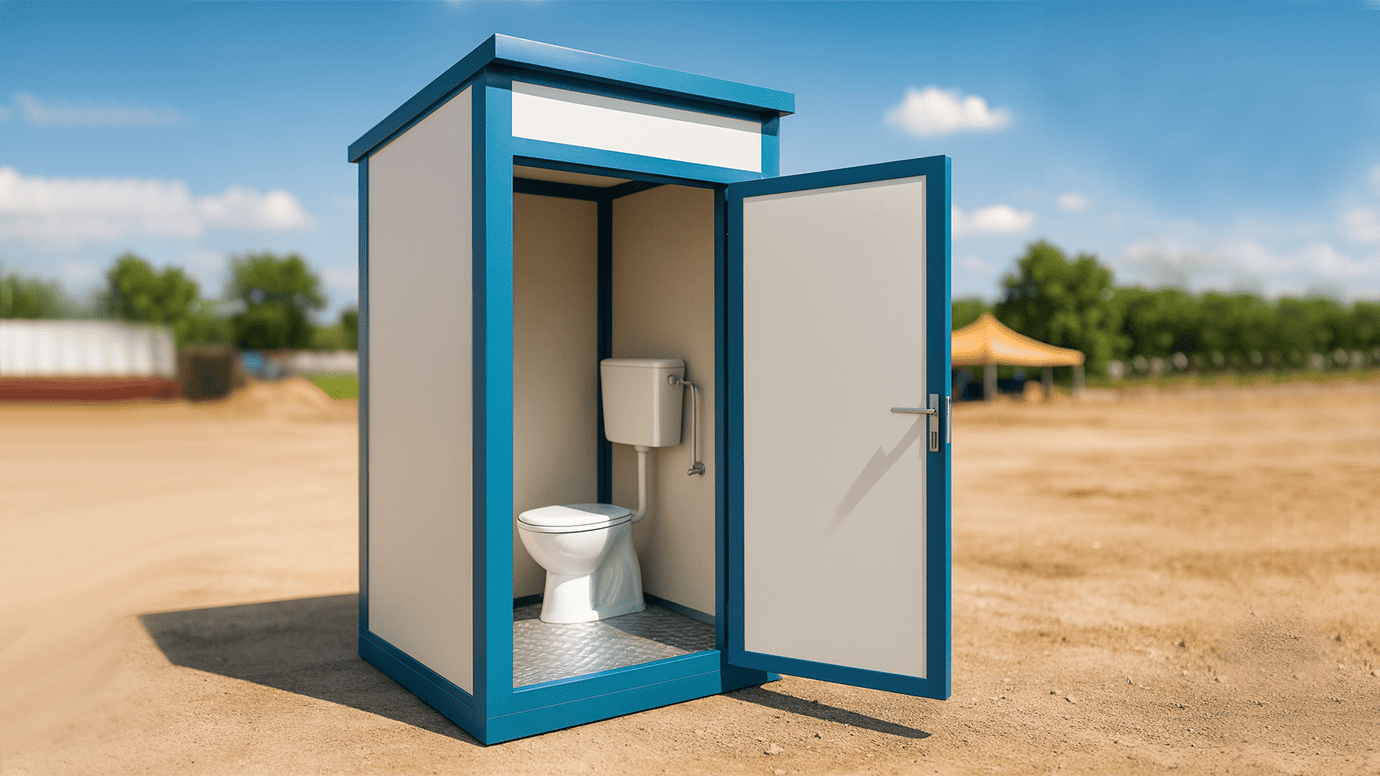
In recent years, innovations in materials have enhanced the functionality and comfort of these essential facilities. One such advancement is the use of PUF (Polyurethane Foam) panels. Known for their strength, insulation properties, and lightweight nature, PUF panels are revolutionizing the construction of portable toilets. These panels not only ensure that the outdoor toilets are more durable but also provide better insulation, which is a significant advantage in both hot and cold climates.
The purpose of this blog is to dive deep into the world of portable toilets made from PUF panels. We aim to educate our readers on the number of advantages and key considerations of opting for porta cabin toilets. Whether you’re planning a large event, managing a construction site, or need an efficient solution for any temporary setup, understanding the benefits of PUF panel construction will help you make informed decisions that can result in better user experiences and cost savings.
Throughout this blog, we’ll explore why PUF panels are an excellent choice for portable toilet construction, the types of porta cabin toilets available, and practical tips on maintenance and compliance. Our goal is to provide you with comprehensive insights and practical advice to improve your understanding of portable toilets, helping you choose the best options for your needs.
What are Portable Toilets?
Portable toilets, commonly known as mobile toilet cabins or outdoor toilets, are standalone units designed to provide sanitary facilities in locations where permanent restrooms are not feasible or are temporarily inaccessible. These units are essential in a variety of settings, from outdoor festivals and large public events to construction sites and disaster relief operations.
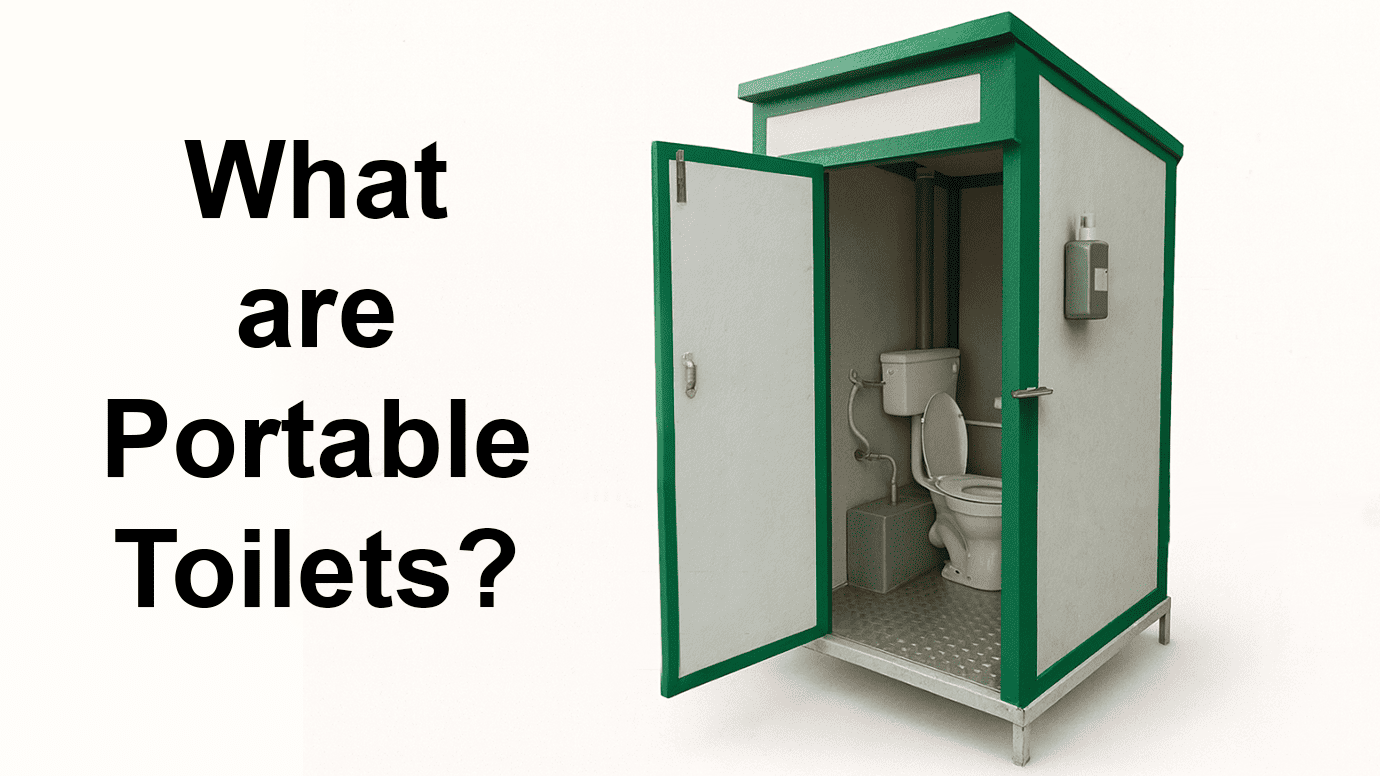
A typical portable toilet includes basic features such as a toilet seat, a holding tank, and hand sanitizer dispensers. Advanced models may also include features like flushing mechanisms, running water, and even air conditioning and heating. The design of these mobile toilet cabins focuses on convenience, hygiene, and privacy, ensuring that users can comfortably and safely take care of their needs.
Porta cabin toilets are particularly valued for their versatility and mobility. Constructed from lightweight yet durable materials, they can be easily transported from one location to another, providing a flexible solution for temporary or changing needs. This mobility is a significant advantage in situations like outdoor events or construction sites, where the location of sanitary facilities needs to be flexible.
The role of portable toilets extends beyond convenience; they are crucial for public health and environmental protection. By providing a contained and controlled sanitation environment, portable toilets help to prevent the spread of diseases and reduce environmental pollution, which could occur from improper waste disposal in outdoor settings.
Portable toilets play an important role in maintaining sanitation and hygiene standards in temporary or remote locations. Their importance is amplified in scenarios where traditional plumbing is unavailable, ensuring that sanitation needs are met efficiently and effectively.
Why Choose PUF Panels for Portable Toilets?
When considering materials for constructing portable toilets, PUF (Polyurethane Foam) panels have emerged as a superior choice compared to traditional materials. Understanding the distinct advantages of PUF panels can help in making an informed decision for anyone looking to invest in movable toilets, mobile toilet cabins, or porta cabin toilets.
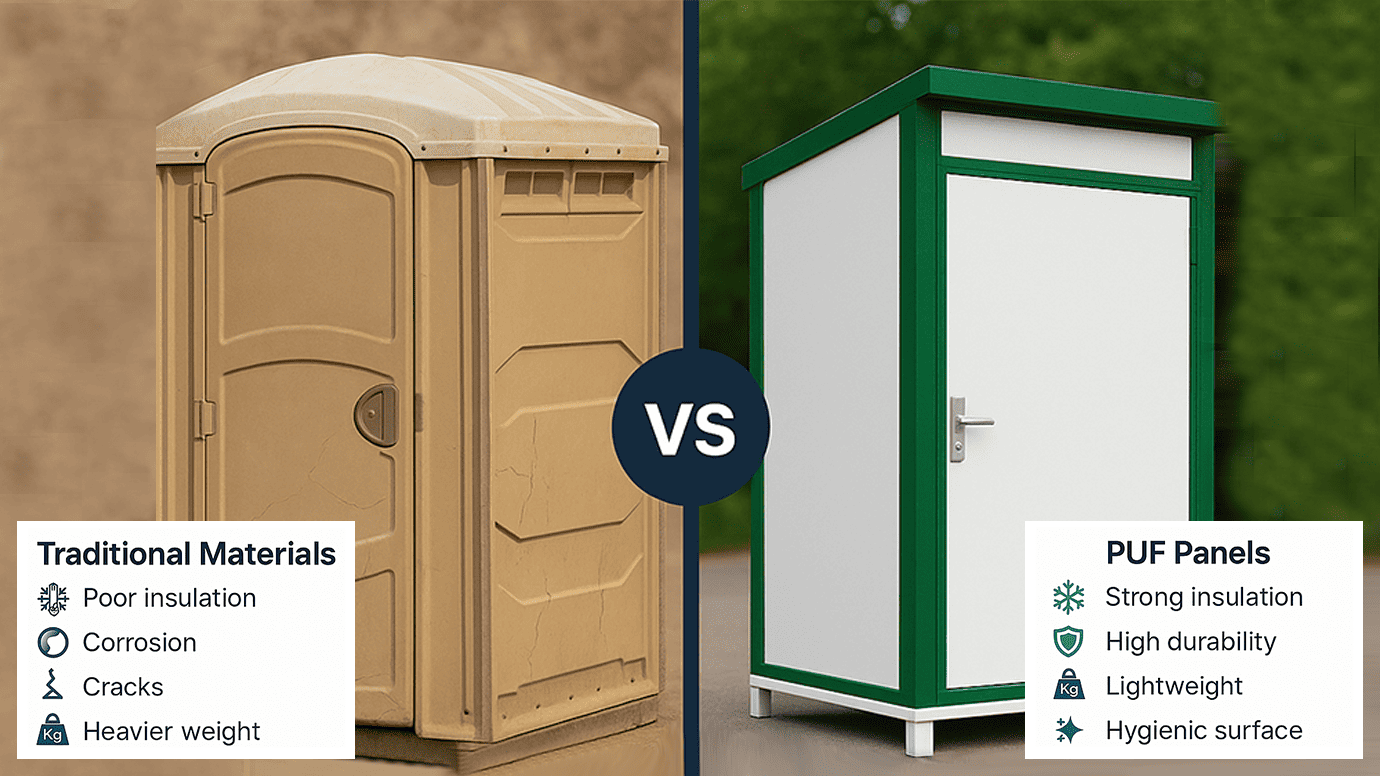
Insulation
PUF panels provide excellent thermal insulation, which is a significant benefit for portable toilets used in both hot and cold climates. This superior insulation ensures a more comfortable user experience in extreme temperatures, a feature that traditional materials cannot match effectively.
Durability and Strength
While traditional materials may degrade or corrode over time due to environmental exposure, PUF panels are robust and resistant to weathering. They do not corrode, warp, or crack, which extends the lifespan of the portable toilet significantly.
Lightweight and Easy to Transport
PUF panels are remarkably lightweight compared to traditional materials, which often require more robust structural support. The lightweight nature of PUF panels makes portable toilets easier to transport and relocate, which is ideal at events, construction sites, and temporary setups.
Hygienic Properties
The smooth surface of PUF panels does not absorb moisture and resists mold and bacteria, making these portable toilets more hygienic than those made with porous materials. This is particularly advantageous for mobile toilet cabins where cleanliness and sanitation are paramount.
Cost-Effectiveness Over Time
Choosing PUF panels for portable toilets also proves to be cost-effective over the long term. The durability and low maintenance requirements of PUF panels mean that the ongoing costs of repairs, replacements, and upkeep are significantly reduced. The initial investment in PUF panel portable toilets might be higher than traditional materials, but the longevity and reduced maintenance translate into considerable savings over time.
Moreover, the ease of cleaning and the inherent strength of PUF panels ensure that the portable toilets remain in service for longer periods without the need for frequent refurbishments or replacements. This aspect is specifically crucial for businesses that operate in the rental market of movable toilets where the return on investment is a key concern.
PUF panels offer a multitude of benefits for portable toilets, making them a smart choice for anyone looking for durable, efficient, and hygienic solutions in movable toilets. The insulation, strength, lightweight nature, and cost-effectiveness of PUF panels are compelling reasons to choose them over traditional materials, ensuring that your investment is both sustainable and beneficial in the long run.
Types of Portable Toilets Made with PUF Panels
PUF (Polyurethane Foam) panels have revolutionized the construction of portable toilets, offering enhanced features that cater to various needs and settings. These movable toilets are available in multiple models and configurations, each designed to provide specific functionalities and conveniences. Below, we explore the different types of PUF panel portable toilets and their unique characteristics.
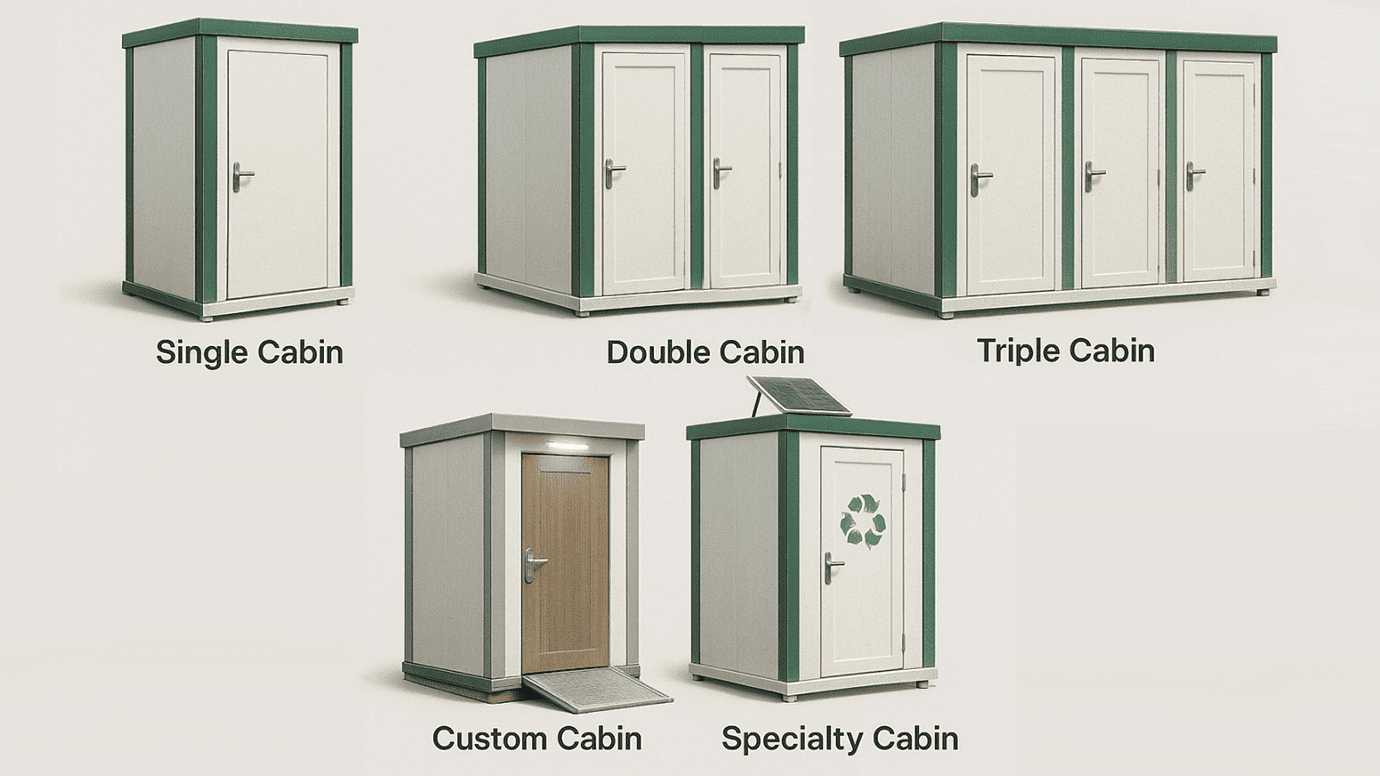
Single Cabin Portable Toilets
The single cabin portable toilet is the most common model, designed for individual use. It's compact and ideal for smaller venues or less frequented locations.
- Features: Typically equipped with a toilet, a hand sanitizer dispenser, and sometimes a small sink. Some models include ventilation fans and solar lights.
- Use Cases: Perfect for small gatherings, private parties, or as additional facilities in parks and recreational areas.
Double Cabin Portable Toilets
These portable toilets include two separate cabins within one unit, doubling the capacity without requiring significantly more space.
- Features: Each cabin operates independently and can include features such as flushing toilets, sinks, and urinals. Accessibility features can also be integrated to accommodate users with disabilities.
- Use Cases: Ideal for medium-sized events, weddings, or festivals where the volume of users is higher but space conservation is still necessary.
Triple Cabin Portable Toilets
A triple cabin portable toilet offers three individual cabins in one unit, maximizing the utility of space and catering to a larger crowd.
- Features: Similar to the double cabin, but with increased capacity. Each section can be equipped with its own set of features, including baby changing facilities in one cabin, if required.
- Use Cases: Best suited for large events, concerts, or busy construction sites where multiple units are needed to maintain hygiene and convenience.
Custom Portable Toilets
Custom portable toilets are designed according to specific client requirements, which can vary from luxury amenities to increased accessibility.
- Features: Options include high-end finishes like wooden floors, full-sized mirrors, LED lighting, and even climate control. Custom units can be made wheelchair accessible, with features like wider doors and grab bars.
- Use Cases: Often used in high-profile events, VIP sections at festivals, or any venue where a premium is placed on comfort and aesthetics.
Specialty Portable Toilets
Specialty portable toilets include features tailored for specific environments, such as chemical toilets for locations without water access or composting toilets for eco-friendly applications.
- Features: These may include environmentally friendly options like solar panels, composting systems, or recirculating flush systems to conserve water.
- Use Cases: Useful in remote areas, environmentally sensitive locations, or at events promoting sustainability.
Choosing the right type of PUF panel portable toilet—whether it’s a single cabin, double cabin, triple cabin, or a custom mobile toilet cabin—depends largely on the specific needs of the event or location. These movable toilets offer flexibility, durability, and a range of features that can be tailored to fulfill the demands of any outdoor toilet application, ensuring user satisfaction and compliance with sanitation standards. With PUF panels, providers can offer superior portable toilets that stand up to the demands of nearly any environment.
Installation and Setup of PUF Panel Portable Toilets
Installing PUF panel portable toilets involves a straightforward process that can be efficiently completed, ensuring that your porta cabin toilet is ready for use quickly and effectively. Proper installation not only improves the functionality and safety of the outdoor toilet but also extends its lifespan. Here’s a detailed look at the installation process, site preparation, access requirements, and tips for a quick setup.
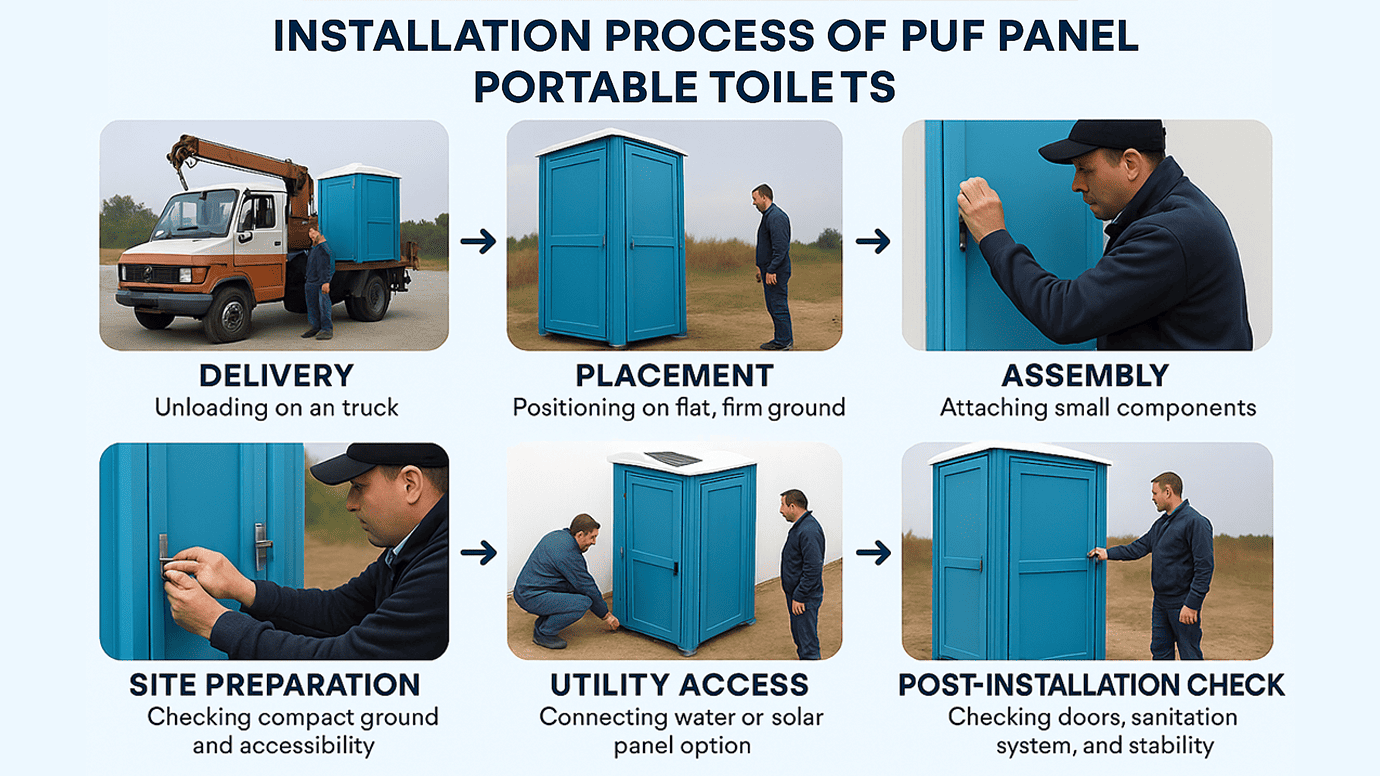
Overview of the Installation Process for PUF Panel Portable Toilets
- Delivery: The first step in the installation process involves the delivery of the portable toilet unit to the designated site. Given their lightweight nature, PUF panel portable toilets are easy to transport and position.
- Placement: Choose a level and firm ground to place the mobile toilet cabin. This ensures stability and prevents any potential tipping hazards. The area should be accessible for service vehicles for maintenance purposes.
- Assembly: Although PUF panel portable toilets often arrive pre-assembled, some models may require minor assembly. This might include attaching small components like locks, toilet paper holders, or signage.
Site Preparation and Access Requirements
- Ground Preparation: Prepare the site by ensuring that the ground is flat and compact. It’s essential to avoid soft, muddy, or uneven terrain that could shift under weight or weather changes.
- Utility Access: If the portable toilet includes features that require water or electrical connections, ensure that there is accessible infrastructure nearby. However, many PUF panel portable toilets are designed to be self-sufficient with solar panels and recirculating flush systems.
- Accessibility: Ensure that the placement meets accessibility standards, providing enough space for entry, exit, and mobility for users with disabilities.
Timeframe for Installation and Tips for Quick Setup
- Timeframe:The installation of a typical PUF panel portable toilet can be completed within a few hours from delivery, depending on the model and site conditions. Custom setups or multiple units may take longer to install.
-
Quick Setup Tips:
1. Prioritize pre-installation planning, including a site visit, which can help to identify possible issues before they arise.
2. Utilize tools and equipment that can handle the panels delicately to avoid damage during setup.
3. Coordinate with service providers for any required utilities or special features ahead of time to ensure a seamless installation. - Post-Installation Check: Once the portable toilet is set up, perform a thorough check to ensure everything is functioning correctly. Verify that doors close securely, sanitation systems operate efficiently, and that there are no structural issues.
By following these guidelines, the installation of PUF panel portable toilets can be a smooth, efficient process, allowing for rapid deployment and immediate use in a variety of settings. Whether it’s a mobile toilet cabin at a construction site or an upscale porta cabin toilet at an event, proper installation ensures that the facilities will be safe, sanitary, and comfortable for all users.
Maintenance and Sanitation of PUF Panel Portable Toilets
Effective maintenance and sanitation are crucial for extending the lifespan and ensuring the hygiene of porta cabin toilets. Specifically, PUF panel portable toilets require routine upkeep to maintain their structural integrity and cleanliness. Here’s a detailed section on daily and periodic maintenance routines, best practices for cleaning and sanitizing, and some common issues and troubleshooting tips.
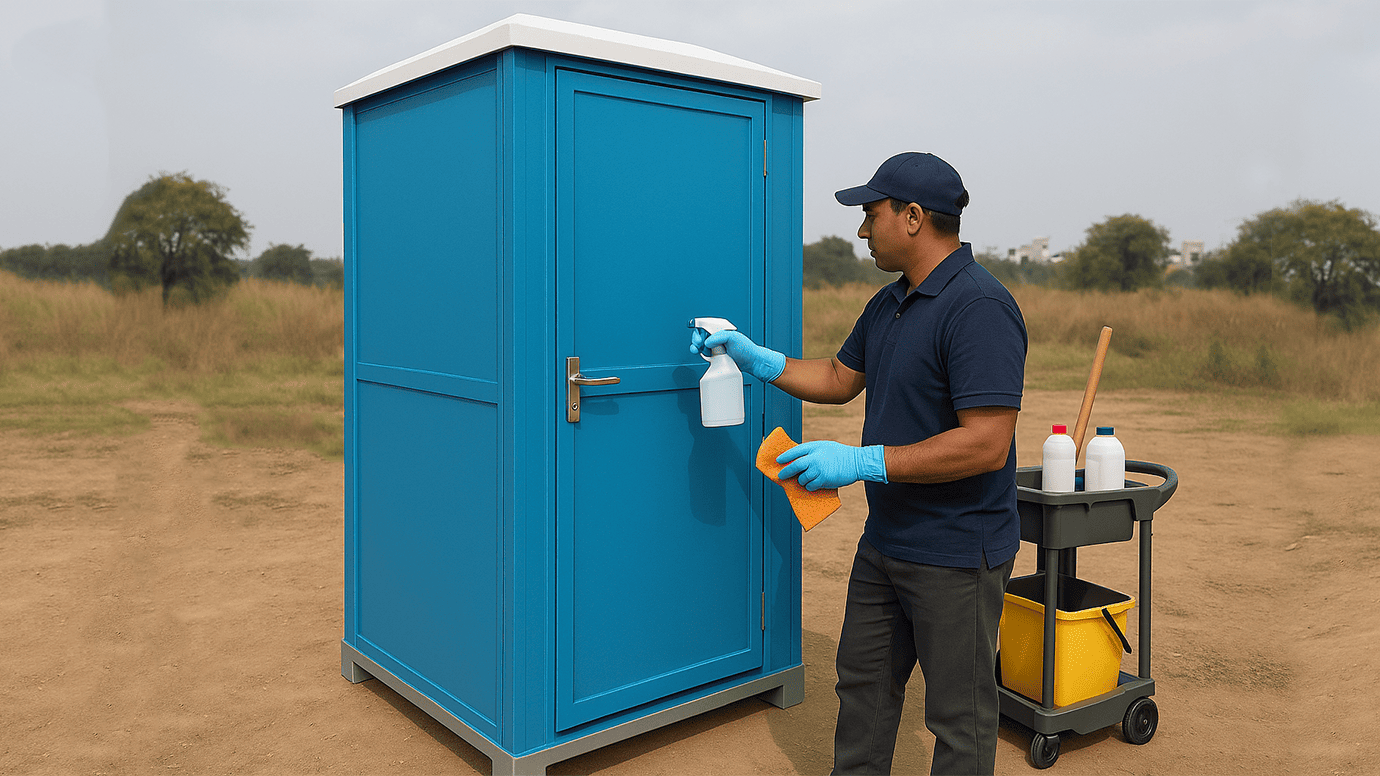
Daily and Periodic Maintenance Routines
- Daily Inspections:Check the portable toilet each day for cleanliness and stock levels of consumables such as toilet paper, soap, and hand sanitizer. Inspect for any visible damage or vandalism that may need immediate repair to ensure user safety and comfort.
- Weekly Sanitizing: Thoroughly clean and sanitize the mobile toilet cabin at least once a week. This involves scrubbing all surfaces with disinfectant, including walls, floors, the toilet bowl, and any fixtures like sinks or handrails.
- Monthly Checks: On a monthly basis, conduct a detailed inspection of the PUF panel’s integrity and all plumbing connections (if applicable). Look for signs of wear or damage and make sure that all seals and joints are intact to prevent leaks and odors.
Best Practices for Cleaning and Sanitizing PUF Panel Toilets
- Use Appropriate Cleaning Agents:Use cleaning products that are effective against bacteria and viruses but gentle on PUF panels. Avoid abrasive cleaners or pads that could scratch or damage the surface of the portable toilet.
- Focus on High-Touch Areas:Regularly disinfect high-touch areas such as door handles, lock latches, and toilet flush levers. This helps to prevent the spread of pathogens and ensures a hygienic environment for all users.
- Ventilation: After cleaning, allow the porta cabin toilet to ventilate adequately before closing it up. This helps clear any chemical fumes and maintains a fresh environment inside the cabin.
Common Issues and Troubleshooting Tips
- Odor Control:One of the most common issues with any portable toilet is managing odors. Use specifically designed deodorizing discs or liquids that not only mask odors but also break down odor-causing bacteria.
- Clogs and Blockages:To prevent clogs, advise users against disposing of anything other than toilet paper in the toilets. Regularly check and clear any potential blockages in waste holding tanks.
- Weather Impact: PUF panels are durable, but extreme weather can still cause issues. After a storm or severe weather, check the outdoor toilet for any structural damage or water ingress that could affect its stability or usability.
By adhering to these maintenance and sanitation protocols, you can ensure that your PUF panel portable toilets remain clean, safe, and functional. Frequent upkeep not only contributes to the longevity of the mobile toilet cabin but also enhances user satisfaction, making it a vital component of managing any portable toilet facilities.
Regulations and Compliance for PUF Panel Portable Toilets
Keeping compliance with health and safety regulations is essential when managing mobile toilet cabins. PUF panel portable toilets are no exception. Following these standards not only ensures the well-being of users but also protects providers from legal liabilities. This section provides an overview of the pertinent regulations and offers practical compliance tips specifically for PUF panel portable toilets.
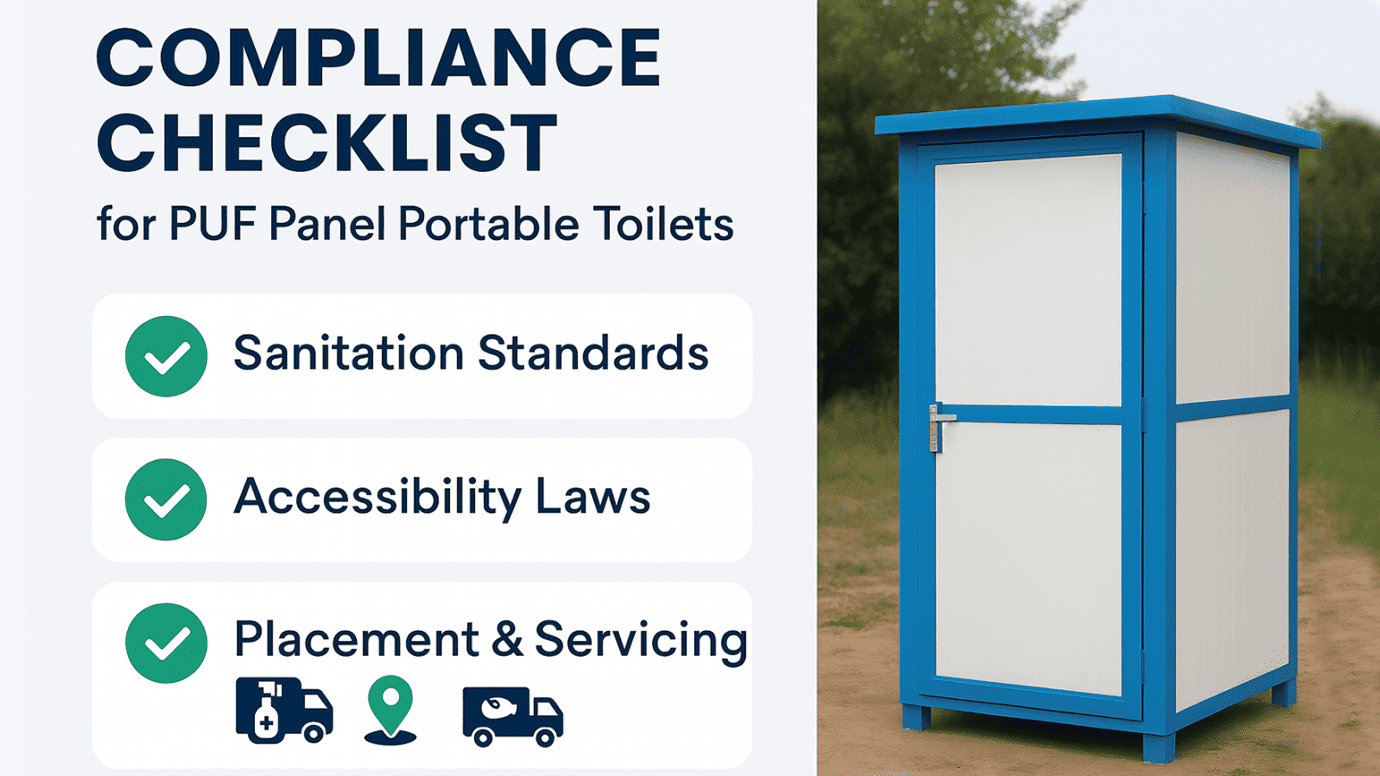
Overview of Health and Safety Regulations
- Sanitation Standards: Most regions have specific standards governing the sanitation of portable toilets. These often include requirements for regular cleaning, waste disposal, and the provision of handwashing or sanitizing facilities.
- Accessibility Laws: In many countries, such as the United States, regulations such as the Americans with Disabilities Act (ADA) mandate that a certain percentage of portable toilets provided at public events or on construction sites must be accessible to people with disabilities. These units must have features like wider doors, no steps, and sufficient internal space for mobility.
- Placement and Servicing: Regulations may also dictate how portable toilets should be placed — considering factors like distance from public access, environmental protection, and frequency of servicing and maintenance to ensure hygiene and functionality.
Compliance Tips for PUF Panel Portable Toilets
- Understand Local Requirements: Always start by understanding and adhering to local regulations. This can involve consulting with local health departments or municipal councils to ensure your mobile toilet cabins meet all required health and safety standards.
- Accessibility Compliance: For PUF panel portable toilets, ensuring that each unit complies with accessibility standards is crucial. Include features such as ramps, handrails, and adequate internal space in your accessible models. Regularly review accessibility guidelines as they can update periodically.
- Routine Inspections and Documentation: Conduct routine inspections and keep detailed records of maintenance, cleaning, and repairs. Documentation should include dates, actions taken, and any issues noted during inspections. This paperwork can be vital for demonstrating compliance in case of audits.
- Environmentally Friendly Practices: Ensure that waste management practices comply with environmental regulations. PUF panels are advantageous because they provide enhanced insulation, reducing the need for chemicals to manage temperature inside the toilet cabin, which can be beneficial from an environmental standpoint.
By following these guidelines, providers of PUF panel portable toilets can ensure they not only meet the required legal and safety standards but also provide a high-quality, compliant service to their users. Effective compliance helps maintain the reputation of the business, ensures user safety, and contributes to the overall success of the operations involving portable, mobile, and outdoor toilets.
FAQs:
Q. What are the main advantages of using PUF panels in a portable toilet?
- The main advantages of using PUF panels in a portable toilet include superior insulation, increased durability, lightweight construction for easy transportation, and ease of maintenance, making them ideal for portable public toilet applications.
Q. How do PUF panel portable toilets compare to traditional portable toilets in terms of durability?
- PUF panel portable toilets offer significantly increased durability and strength compared to traditional materials, which means they are less prone to damage from environmental factors and frequent use, ideal for settings requiring a mobile toilet cabin.
Q. What types of portable toilets are available with PUF panels?
- There are several types of PUF panel portable toilets, including single cabin, double cabin, triple cabin, and custom configurations, which cater to everything from portable public toilets to exclusive portable toilets for camping.
Q. Can PUF panel portable toilets be customized for specific events or needs?
- Yes, PUF panel portable toilets can be customized to meet specific needs, including luxury amenities for high-profile events or accessible features for portable toilets for elderly or seniors.
Q. What are the environmental benefits of choosing PUF panel portable toilets?
- Choosing PUF panel portable toilets is environmentally beneficial due to their energy-efficient insulation properties and durability, which decrease the need for frequent replacements and maintenance.
Q. How easy is it to transport PUF panel portable toilets?
- Due to their lightweight nature, PUF panel portable toilets are very easy to transport and set up, making them an excellent choice for emergency toilets and portable toilets for camping.
Q. How often should PUF panel portable toilets be cleaned and maintained?
- PUF panel portable toilets should undergo daily inspections and weekly thorough cleanings, with monthly checks recommended for structural integrity, crucial for maintaining hygiene in portable public toilets.
Q. Can PUF panel portable toilets be used in any climate?
- Yes, the insulation properties of PUF panels make these portable toilets suitable for any climate, from hot summers to cold winters, ideal for year-round outdoor toilets.
Conclusion
Throughout this blog, we have extensively discussed the numerous benefits and diverse applications of PUF panel portable toilets, which are also known as mobile toilet cabins, porta cabin toilets, and outdoor toilets. PUF panels are renowned for their superior properties that significantly enhance the functionality of portable sanitation solutions. These advantages make PUF panel portable toilets a standout choice in the market, celebrated for their sustainability, durability, and practicality.
PUF panels are exceptionally durable and robust, capable of tolerating harsh weather conditions and frequent use. This makes these portable toilets ideal for both short-term events and long-term installations. The superior insulation of PUF panels ensures that the internal temperature of mobile toilet cabins is comfortable, regardless of the external weather conditions, making them suitable for a variety of climates.
Furthermore, the lightweight nature of PUF panels makes these portable toilets easy to transport and relocate, which is particularly beneficial for events and projects that require quick setup and breakdown. They are also designed to be easily cleaned and maintained, supporting high standards of hygiene with surfaces that resist moisture and inhibit the growth of mold and bacteria.
Although the initial investment in PUF panel portable toilets might be higher, the long-term savings are significant. These savings are due to the reduced need for repairs and replacements, thanks to the longevity and low maintenance requirements of PUF panels.
As we conclude, it’s clear that PUF panel portable toilets are not just a practical choice but also a smart investment. They meet the needs of modern outdoor activities with efficiency, comfort, and sustainability. Whether you are planning an event, managing a construction site, or in need of reliable outdoor toilets for any other temporary or permanent application, PUF panel portable toilets should be at the top of your list. Their innovative design and superior performance not only meet the demanding needs of users but also contribute positively to environmental conservation efforts. By choosing PUF panel portable toilets, you are opting for a solution that supports durability, efficiency, and environmental responsibility.
To know more about other type of Portable cabins and their installation, go to our Porta Cabin Installation Service Page.
